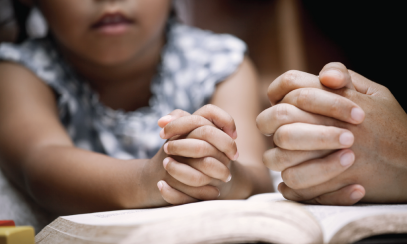
Tips for Helping Children Ask for Forgiveness
I remember a heated conflict with my brother when we were in middle school. It went on for days because we were both stubborn and unforgiving. In his prayerful wisdom, Dad took us outside and told us to race to the fence and back as fast as we could. Then he asked us to run the race again, but this time he tied a cinder brick to our ankles. We made a miserable attempt at the second race, and when we gave up, he simply looked at us and said running that race with the brick was a lot like trying to lug around un-forgiveness and blame; it serves no purpose and just becomes an obstacle that gets heavier over time.
Conflict disrupts our peace, and forgiveness and reconciliation are the ways we restore it. Seeking peace and forgiveness in a relationship can be tricky and powerful work. It demonstrates great humility and a desire to grow in holiness when we are able to reach out to someone we’ve offended or hurt and ask for forgiveness. Sometimes we lug around the burden of conflict because we really don’t know what to say or how to ask for forgiveness. Here are some tips for helping children (or adults) find peace and ask for forgiveness.
Think and pray about the conflict together. Try to discover the emotion at the root of the conflict. Has the conflict left the other person feeling angry, embarrassed, jealous or betrayed? Understanding the root fosters the empathy and understanding necessary for forgiveness and reconciliation.
Talk it out. Having a conversation with the person or people involved in the conflict is the next step. That conversation has a few important components. The first step is accepting responsibility. Admitting the offense is powerful both for the offender and the offended. The next step is to express regret. “I’m sorry what I did embarrassed you,” or, “It was wrong for me to make you feel left out” are statements that bring peace.
Make it right. Conflict can damage trust. If someone has hurt us, we need to be assured they won’t do it again, so it’s important to talk about ways the offender can “make things right” to begin to rebuild that trust.
The final step to the process is to ask for forgiveness. Those simple, humbling words allow the peace and healing to begin. Remember the words of 1 John: “If we acknowledge our sins, [God] is faithful and just and will forgive our sins and cleanse us from every wrong-doing.” (9)



